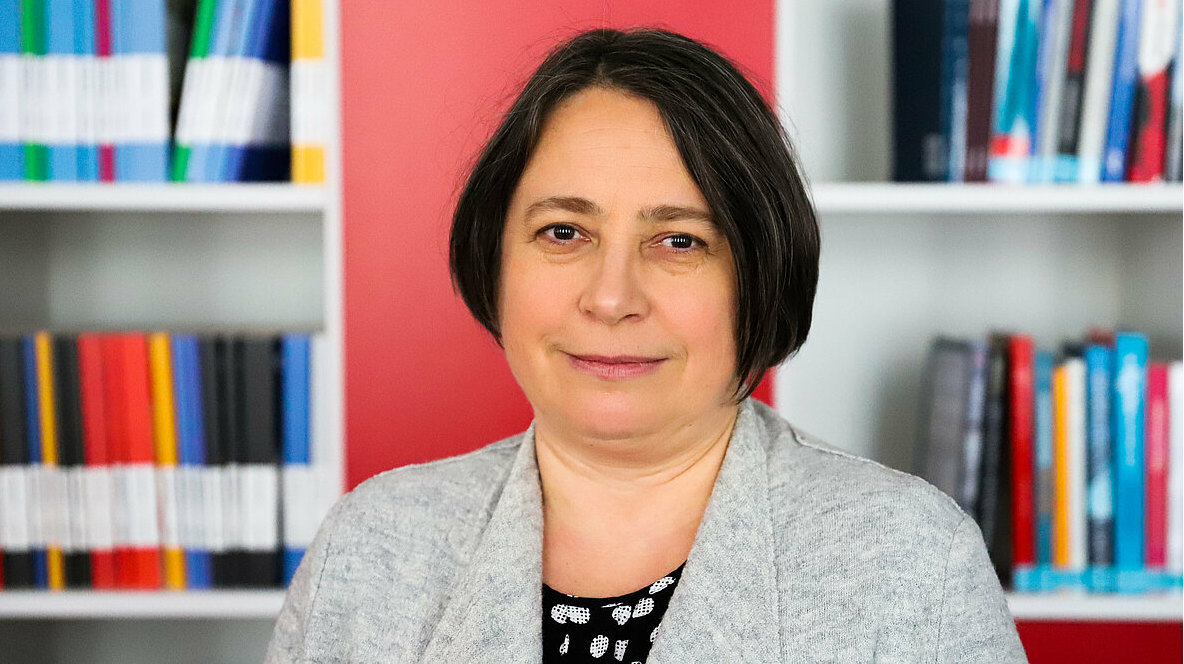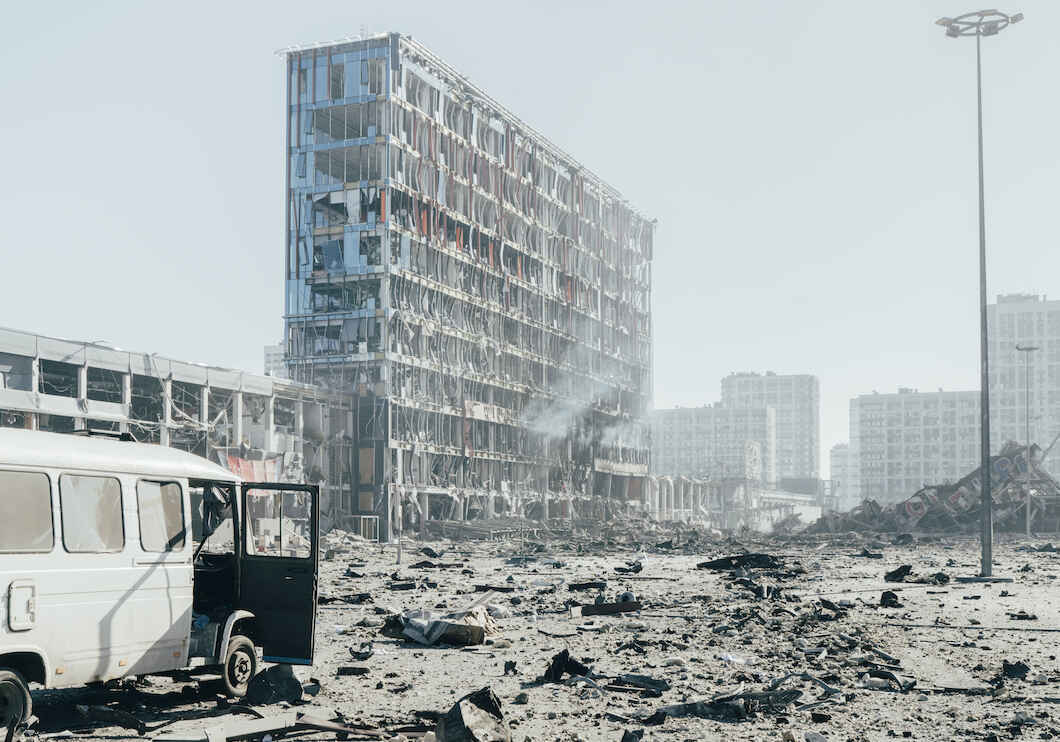
Foto: ZOiS
War and Memory in the Post-Soviet Space: Arming without Borders?
How is the current Russian military assault on Ukraine accompanied by a "war of memory"? Tatiana Zhurzhenko, Ukrainian expert on the politics of history, deconstructs elements of Russian propaganda, explains intra-Ukrainian conflicts over memory and history, and asks about the impact of the war on European identity.
The following text is based on Tatiana Zhurzhenko's opening talk at the EUSTORY digital network meeting on March 29, 2022.
Von Tatiana Zhurzhenko
For the last two decades, Europe – and Eastern Europe in particular – has been haunted by conflicts around alternative and often irreconcilable interpretations of the past. It would be tempting to see the current Russian-Ukrainian war as an escalation of such a mnemonic conflict between two countries – from a symbolic and political to a military level. While such a causal link does not exist, Vladimir Putin indeed used some false or distorted historical narratives to legitimize Russia’s »special operation« in Ukraine.
In his public speeches, interviews, and in his pseudo-academic article »On the Historical Unity of Russians and Ukrainians« published in summer 2021, he claimed that Ukraine is an artificial state which was created by Vladimir Lenin and that Russians and Ukrainians are one single people. Putin argues that radical nationalists and Nazis took power in Ukraine which therefore should be subject to »de-Nazification«. Moreover, he views Ukraine as an ’anti-Russia project’ of the West, an instrument to undermine the Russian civilization. Since the beginning of the Russian invasion of Ukraine we have heard a similar rhetoric from the former president Medvedev and other Russian politicians; on the website of the state-owned news agency RIA Novosti one can read articles using genocidal language and calling for the destruction of the Ukrainian state and Ukrainian identity.
Is this obsession with history more than propaganda, does it reflect the mindset of Russia’s political elites? Probably not by accident, Vladimir Medinsky, the head of the Russian delegation at the current negotiations with Ukraine, is also a historian and the author of several books debunking alleged Western myths about Russia. A former Minister of Culture, he is the chair of the Russian Military-Historical Society, a Kremlin-controlled association implementing large-scale commemorative projects.
The origins of today’s weaponization of historical narratives can be traced back to Ukraine’s Orange Revolution
Let us be clear: none of Putin’s »historical arguments« provides any legitimation for the Russian invasion of Ukraine; holding a historical debate with an aggressor or his propagandists would be inappropriate. Instead, we can study the weaponization of memory as one of the dimensions of the Ukrainian-Russian conflict, which in fact had started long before February 24, 2022. The origins of today’s weaponization of historical narratives can be traced back to Ukraine’s Orange Revolution.
In the wake of the 2004 presidential elections, spin doctors working for the Ukrainian Party of Regions denounced their opponent Viktor Yushchenko as a radical nationalist and created a semantic link that equated Ukrainian nationalism with fascism and, by extension, with Nazism. This association, which drew on an old Soviet ideological cliché, was deployed in political propaganda and picked up by Moscow in support of Viktor Yanukovych’s political efforts against Yushchenko. When Russia supported the anti-Yushchenko campaign in Ukraine it could build on its experience of memory wars with the Baltic countries.
The new Lithuanian, Latvian and Estonian national identities constructed in the early 1990s were based on the narrative of Soviet occupation and anti-Soviet national resistance. By instrumentalizing the issue of collaboration with Nazism and participation in the Holocaust, Russia questioned the legitimacy of the Baltic countries’ post-Soviet nationhood and the commitment of their elites to European values. In this way, Moscow sought to compromise the political elites in the Baltic states as revisionists, radical nationalists and Nazi sympathizers. At the same time, the triumphalist memory of the Soviet victory over Nazi Germany, the myth of the »liberation of Europe from fascism« was appropriated by the Russian political elites as the backbone of the new Russian national identity. In the post-Soviet space, subscribing to this narrative has become a test for the political loyalty to the Kremlin.
Viktor Yushchenko’s controversial memory politics, first of all, the rehabilitation of the Ukrainian nationalist movement and its fight for national independence during and after World War II, polarized the society. Ukraine’s divided political elites have used conflicting memories and antagonistic historical symbols as a tool for mass mobilization. Russia has profited from these domestic Ukrainian »memory wars« in its efforts to weaken Ukraine and prevent its re-orientation to the West. In spring 2014 antagonistic historical narratives were weaponized by the Kremlin and its allies in Ukraine to fuel unrest, undermine public institutions and de-legitimize the Ukrainian state.
There is irony in the fact that Putin’s invasion aimed at the »denazification« of Ukraine is repelled by a Russian speaking president of Jewish origin
When Russia annexed Crimea to punish Ukraine for the Euromaidan revolution, most of the »historical arguments« used by Vladimir Putin today were already there. In his speech at the occasion of the »inclusion« of Crimea and Sevastopol into the Russian Federation the Euromaidan was presented as a fascist coup in Kyiv and a Western plot while Moscow justified its actions by protecting Russian-speakers from »Ukrainian fascists«. Russians as a »divided people« appeared as the collective victim of the disintegration of the Soviet Union, and the West was accused of creating a wall between Ukrainians and Russians who in fact are a single people. The legitimacy of the transfer of the Crimean Peninsula to Soviet Ukraine in 1954 was officially denied; the myth of the Christianisation of Prince Vladimir from the Kiev Rus in ancient Chersonesus was instrumentalized to prove the particular place of Crimea in the thousand years old Russian history.
Moreover, the myth of Sevastopol as a city of Russian military glory played an important role in the pro-Russian mobilization of the local population, and the »Novorossia« project – an alternative pro-Russian state formation in the southeast of Ukraine – was justified by the centuries long history of Russia’s imperial expansion in the Black Sea region. In post-Crimean Russia, the »Russian World« made an impressive career from a marginal conservative idea to the mainstream ideology of Russian neo-imperial expansionism. Merging imperial, nationalist, Soviet and Orthodox symbols, the »Russian World« presents itself as a unique Russian civilization challenging the Western liberal order. The »Great Patriotic War« and Russia’s historical »anti-fascist« mission became the core of this quasi-ideology.
In post-Maidan Ukraine, memory politics loomed large, too, but for different reasons. While the Euromaidan was sparked by the Ukrainian government's decision not to sign the association agreement with the EU and continued as protests against corruption and police violence, Russia’s increasing support for the Yanukovych regime contributed to reframing the conflict through an anti-colonial lens. Soviet symbols in the public space came to be perceived as symbols of Russian imperial power; numerous Lenin monuments, appropriated by the Anti-Maidan as symbols of resistance to the »fascist junta«, were toppled by Ukrainian activists. In response to Russia’s aggression, some icons of Ukrainian nationalism such as Stepan Bandera were reinterpreted as symbols of national liberation. In 2015, the new »decommunization« legislation criminalized Soviet (and Nazi) symbols and banned them from public space; new official symbols of remembrance such as the red poppy were introduced to gain distance from the old Soviet narrative of the »Great Patriotic War« and its symbols (like the St. George ribbon).
The ban on Soviet symbols caused a discussion within Ukraine. The opponents of the »decommunization« criticized not so much the necessity of dealing with the Soviet past than the »Bolshevik« methods and the divisive effects of this policy. With the victory of Volodymyr Zelenskyy in the 2019 presidential elections, however, the »mnemonic warriors« were marginalized. Representing the Russian speaking East and South of Ukraine, Zelenskyy was reluctant to take sides in the domestic memory wars and emphasised the civic and political identity of the Ukrainians. There is quite some irony in the fact that Putin’s invasion aimed at the »denazification« of Ukraine is repelled by a Russian speaking president of Jewish origin.
How will the war in Ukraine be remembered in the EU?
Similarly to 2014, but to an unprecedented degree, memory is weaponized by Russia to legitimize its full-fledged military aggression against a sovereign country, the destruction of the Ukrainian state and, as we increasingly are witnessing in the last days, the genocidal intentions of the Kremlin. Unlike in 2014, however, Ukraine demonstrates resilience of state institutions and civil society, national unity and a strong political identity. It seems, internal conflicts on memory and history are deemed irrelevant in front of a mortal danger. The ongoing war has already produced a huge collective trauma for which the Ukrainian society will need decades to cope with. And a new national narrative is already in the making which places this war in a decolonization perspective challenging the established cultural hierarchies in the Ukrainian-Russian relations.
And what about Europe? How will the war in Ukraine be remembered in the EU? What will this war do to the European identity and the European project which draws on the lessons of World War II and which is based on the moral imperative that war crimes must not go unpunished? One thing we have already learnt is that the danger of militarism and revanchism does not necessarily come from the far right, nationalists and neo-Nazis, but from those who claim to fight them. Regardless of our answer to the question if Putin’s regime can be qualified as fascist, we just see that »anti-fascist« narratives can be weaponized, too, and merged with neo-imperial and nationalist ones in order to wage a war of aggression and destroy the peace in Europe.
Tatiana Zhurzhenko, political scientist, started her career at the University of Kharkiv in Ukraine. She currently works as researcher at the Centre for East European and International Studies (ZOiS).

